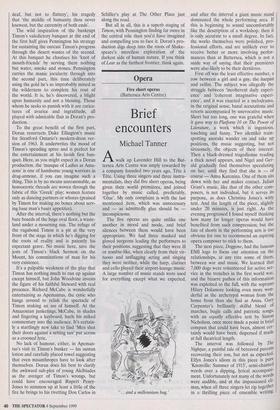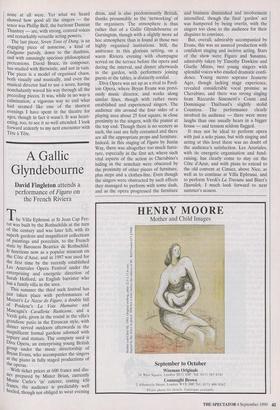Opera
Five short operas (Battersea Arts Centre)
Brief encounters
Michael Tanner
Awalk up Lavender Hill to the Bat- tersea Arts Centre was amply rewarded by a company founded two years ago, Tete a Tete. Using three singers and three instru- mentalists, they did five short operas, being given their world premieres, and joined together by music called, predictably, `Glue'. My only complaint is with the last mentioned item, which was unnecessary and — as admittedly glue should be inconspicuous.
The five operas are quite unlike one another in mood and mode, and brief silences between them would have been appropriate. We had three masked and gloved surgeons leading the performers to their positions, suggesting that they were ill or zombie-like, when clearly from their vir- tuoso and unflagging acting and singing they were neither, while the harp, clarinet and cello played their airport-lounge music. A large number of music stands were used for everything except what we expected, " . . and a millennium bug.' and after the interval a giant music stand dominated the whole performing area. If this is beginning to sound uncomfortably like the description of a workshop, then it is only accurate to a small degree. In fact, the works themselves were polished, pro- fessional efforts, and are unlikely ever to receive better or more involving perfor- mances than at Battersea, which is not a snide way of saying that their premieres were also likely to be their dernieres.
First off was the least effective number, a row between a girl and a guy, the harpist and cellist. The subject was allegedly the struggle between 'incoherent daily experi- ence' and 'coherent imaginative experi- ence', and it was enacted as a melodrama, in the original sense, banal accusations and retorts accompanied by unevocative music. Short but too long, one was grateful when it gave way to Platform 10 or The Power of Literature, a work which is ingenious, touching and funny. Two identikit train- spotting anoraks wander on and take up positions, the music suggesting, but not tiresomely, the objects of their interest. Then a black-dressed tragedienne reading a thick novel appears, and Nigel and Ger- ald gradually find themselves speculating on her, until they find that she is — of course — Anna Karenina. One of them sits down with her and makes contact. Julian Grant's music, like that of the other com- posers, is not individual, but it serves its purpose, as does Christina Jones's witty text. And the length of the piece, slightly under 20 minutes, is just right. As the evening progressed I found myself thinking how many far longer operas would have benefited from such compression; but the fate of shorts in the performing arts is too obvious for one to recommend an aspiring opera composer to stick to them. The next piece, Doggone, had the famous EMI logo to focus our attention on the relationships, at any rate some of them, between war and music. We learned that 7,000 dogs were volunteered for active ser- vice in the trenches in the first world war, and the bizarre pathos of this information was exploited .to the full, with the soprano Hilary Dolamore looking even more won- derful as the archetypal woman from the home front than she had as Anna. Gary Carpenter's brilliantly skilful blend of marches, bugle calls and patriotic songs, with an equally effective text by Simon Nicholson, once more made a point in brief compass that could have been, almost cer- tainly would have been, dispersed if made at full theatrical length. The interval was followed by The Nightjar, a painful tale of bereaved parents recovering their son, but not as expected. Elfyn Jones's idiom in this piece is pure `Knoxville: Summer of 1915', semi-chanted words over a dipping, lyrical accompani- ment. Unfortunately not many of the words were audible, and at the impassioned cli- max, when all three singers let rip together in a thrilling piece of ensemble writing, none at all were. Yet what we heard showed how good all the singers — the tenor was Phillip Bell, the baritone Damian Thantrey — are, with strong, centred voices and remarkably versatile acting powers. The last piece, Seven Tons of Dung, is an engaging piece of nonsense, a kind of Endgame parody, down to the dustbins, and with amusingly specious philosophical pretensions. David Bruce, its composer, has studied with Birtwistle, and not in vain. The piece is a model of organised chaos, both visually and musically, and even the musical director had to use a score, having nonchalantly waved his way through all the preceding pieces. It was, while in no waya culmination, a vigorous way to end what had seemed like one of the shortest evenings I have spent in the theatre for ages, though in fact it wasn't. It was heart- ening, too, to see it so well attended. I look forward ardently to my next encounter with Tete a Tete.



























































 Previous page
Previous page